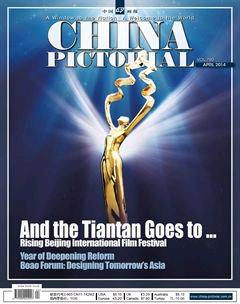Journey to Cooperation:Conquering Barriers
by+Xuan+Kang



Several of the most popular films on the Chinese main- land in 2013 were co-productions. Particularly, films coproduced by Chinese mainland and Hong Kong studios such as Journey to the West: Conquering the Demons, Young Detective Dee: Rise of the Sea Dragon, and American Dreams in China achieved both box office and critical success. In fact, cooperative film production has long been a hot issue. In recent years, Hollywood films such as Cloud Atlas, Looper, The Expendables II, and Iron Man 3 sought to enter the Chinese market as international co-productions rather than imports. Although their attempts ultimately failed, international co-productions became common and inspired widespread debate. Today, co-productions integrating international funds, marketing experience, and human resources have become mainstays of the fast-growing Chinese mainland film market.
Applause vs. Criticism
From 2001 to 2011, the decade after China joined the World Trade Organization, some 40 co-produced films hit Chinese theaters annually. Since 2007, several co-productions have consistently made it onto Chinese annual top 10 lists.
The reasons foreign filmmakers seek cooperation with Chinese mainland studios can vary, but the most common motivation is that co-productions are treated as domestic on the Chinese mainland, enabling producers to reap greater shares of box office revenue than with imports. For this reason, China has laid out strict requirements regarding co-productions: Their plots must be related to China, at least a third of lead actors must be mainland Chinese, and at least some shooting must be done on the mainland.
Currently, cooperative projects between Chinas mainland and Hong Kong make up the majority of co-productions in the Chinese market. Statistics released by China Film Co-Production Cooperation show that in 2013, China approved 55 co-produced film projects, of which 62 percent joined mainland and Hong Kong studios. From 2003 to 2012, Chinas mainland and Hong Kong co-produced 322 films, accounting for 68.5 percent of all co-productions in China.
Cinematic cooperation between Chinas mainland and Hong Kong can be traced back to the early days of Chinas reform and opening-up. However, the phenomenon began to boom in 2003, when the mainland and Hong Kong signed the Closer Economic Partnership Arrangement (CEPA). According to the agreement, films co-produced by both sides enjoy equal treatment as domestic productions in both mainland and Hong Kong markets.
Around the turn of the 21st Century, Hong Kongs film industry began to see decline – not only in its local market but also in Taiwan and greater Southeastern Asia. CEPA injected new life into the struggling film industry. A number of Hong Kong studios, including Media Asia, Universe, China Star Entertainment, and Filmko Entertainment, swarmed into the mainland market, heralding a decade of boom in mainlandHong Kong co-production.
Most Hong Kong directors greeted the mainland market with action, gangster, and martial arts movies featuring strong Hong Kong flavor. Even Hong Kong filmmaker Bak-Ming Wong, famed for comedies, began exploring co-production with a martial arts movie. In 2005, Seven Swords, a martial arts film produced by Bak-Ming Wong and directed by Tsui Hark, earned more than 80 million yuan on the Chinese mainland, ranking it third of the years top films. Yet, its box office earnings totaled only HK$7 million in Hong Kong. The gigantic gap between the two figures opened Hong Kong filmmakers eyes to the importance of the mainland market.
In late 2006, Hong Kong director Peter Chan began to shoot The Warlords. Unlike previous mainland-Hong Kong co-productions that primarily relied on Hong Kong crews, the film was primarily produced and distributed by mainland film studios. The film received great acclaim when it hit theaters in 2007. Later,mainland-Hong Kong co-productions Painted Skin (2008) and Bodyguards and Assassins (2009) succeeded in terms of both reputation and box office revenues.
Despite their market success, some mainland-Hong Kong coproductions drew stinging criticism from industry insiders. Since 2004, few mainland-Hong Kong co-productions with medium or smaller budgets have achieved success in the mainland market. Some even earned much less on the mainland than in Hong Kong. Moreover, some critics argue that Hong Kong filmmakers gave up their unique edge to cater to the mainland market, relegating Hong Kongs film industry to an apprentice to its mainland counterpart. Currently, Hong Kongs film market is comparable to that of Beijing or Shanghai alone.
Mutual Integration
The road to international co-production isnt always smooth.“Naturally, it takes time for Hong Kong directors to become accustomed to the mainland market,” remarks Wei Junzi, a critic and expert on Hong Kong films. “This is normal.” In recent years, Hong Kong directors have gradually found their positions within the mainland market. “For instance, Tsui Harks martial arts films enjoy a good reputation, Pang Ho-cheung is an expert at comedy, and Johnnie To has successfully introduced elements of gangster films into mainland productions,” Wei adds.

In fact, the mainland and Hong Kong have walked a road of mutual influence and integration as they have cooperated. Chinese mainland films have long been criticized as “boring, didactic, and full of political sentiments.” Market-oriented Hong Kong films can enhance the entertaining elements of mainland films. Moreover, the influx of Hong Kong directors and their products have pressured mainland filmmakers. Competition from mainland-Hong Kong co-productions has forced Chinese mainland directors to focus on commercial films and cooperate with filmmakers and actors from Hong Kong. For instance, renowned Hong Kong actors Chow Yun-fat and Donnie Yen have frequently appeared in mainland directors films, and more and more Hong Kong crews are joining specifically mainland projects.
Along with Hong Kongs globally-iconic martial arts and action films, mainland-Hong Kong co-productions have spread across a wide array of genres including romance, history, and comedy. For instance, A Simple Life depicts lives of ordinary Hong Kong residents and Cold War features a strong flavor of Hong Kong crime films, yet both are mainland-Hong Kong coproductions.
Most importantly, perhaps, Chinese mainland and Hong Kong filmmakers have been exchanging ideas with each other. “Im no longer a pessimist,” one Hong Kong film critic commented.“Mainland filmmakers have learned how to produce commercial films from their Hong Kong counterparts, while Hong Kong filmmakers have found a ‘second spring on the mainland. The situation has changed. The relationship between Hong Kong and mainland film industries never became a kill-or-be-killed battle, as some predicted.”

